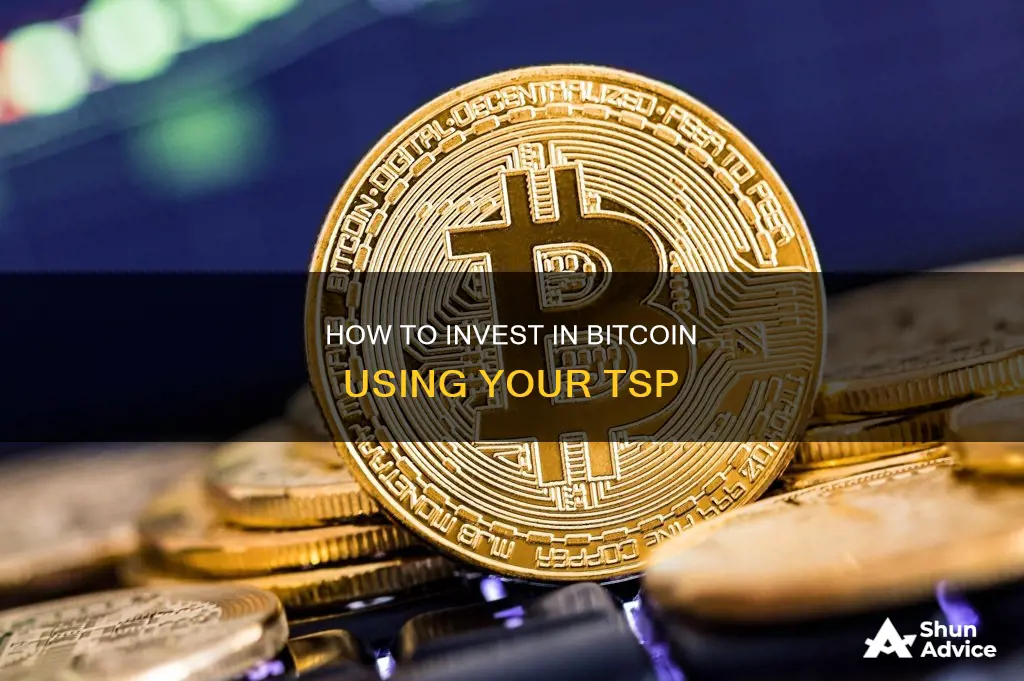
The Thrift Savings Plan (TSP) is a retirement plan for federal employees and members of the uniformed services. It is similar to a 401(k) plan, offering tax-advantaged retirement savings and investment options. While investing in Bitcoin through a TSP is not allowed, there are alternative ways to gain exposure to Bitcoin and other cryptocurrencies. One option is to transfer funds from a TSP account to a self-directed individual retirement account (SDIRA), which allows for investments in a broader range of asset classes, including cryptocurrencies. It is important to note that investing in cryptocurrencies carries significant risks due to their volatile nature. Before making any investment decisions, individuals should carefully consider their financial goals and conduct thorough research or consult with a qualified financial advisor.
| Characteristics | Values |
|---|---|
| Can I use a TSP to invest in Bitcoin? | No |
| Is it possible to transfer a TSP to an IRA or a 401K? | Yes, but only after leaving the employer offering the TSP |
| What is the penalty for cashing out a TSP? | 10% penalty and income taxes, and loss of any funds that were not vested |
| What is a TSP? | A qualified retirement plan for federal employees and members of the Uniformed Services who have taken the oath of office |
| What are the benefits of a TSP? | Traditional and Roth contributions permitted, lower fees, employer automatic and matching contributions, catch-up contributions allowed, loans and in-service withdrawals for flexibility |
| What are the contribution limits for a TSP in 2024? | Elective deferral limit: $23,000; Annual addition limit: $69,000; Catch-up contribution limit: $7,500 |
What You'll Learn

What is a Thrift Savings Plan (TSP)??
A Thrift Savings Plan (TSP) is a defined-contribution retirement investment program. It is only open to federal employees and uniformed service members, including the Ready Reserve. It is a defined-contribution (DC) plan that offers federal employees many of the same benefits that are available to workers in the private sector.
The TSP is similar to a 401(k) plan offered by private employers. Participants in a TSP can get an immediate tax break for their savings and choose to invest in a Roth for freedom from taxes after retirement. They can put their money into any of six investing options. The contribution limit for 2023 is $22,500, and $23,000 in 2024. Employees aged 50 and over can also make catch-up contributions of $7,500 in either year.
The TSP offers a choice of six funds and a mutual fund option:
- The Government Securities Investment (G) Fund
- The Fixed-Income Index Investment (F) Fund
- The Common-Stock Index Investment (C) Fund
- The Small-Capitalization Stock Index Investment (S) Fund
- The International-Stock Index Investment (I) Fund
- Specific Lifecycle (L) funds
As a retirement plan, the TSP has the benefit of extremely low administrative expenses. Plan participants pay significantly less than the fees associated with most comparable retirement plans. However, the TSP also has one major disadvantage: limited investment options.
TSP participants can choose between five individual funds, composed of different categories of stocks or bonds. Or, they can opt for a lifecycle fund, which includes a unique mix of these five individual funds tailored towards a target retirement date.
Using a TSP to Invest in Bitcoin
While investing in Bitcoin through a TSP is not allowed, participants can transfer money from a TSP into a self-directed IRA (SDIRA), which does allow for investing in Bitcoin.
A Small Investment, Big Returns: Bitcoin's $100 Entry Point
You may want to see also

Can I use a TSP to invest in Bitcoin?
The Thrift Savings Plan (TSP) is a tax-deferred retirement savings and investment plan for federal employees and members of the uniformed services, including the military. It is similar to a 401(k) plan offered by private companies.
While investing in Bitcoin through a TSP is not allowed, there are alternative options for TSP account holders.
SDIRA
One option is to transfer TSP funds into a self-directed individual retirement account (SDIRA). SDIRAs allow account holders to invest in a broader range of asset classes than traditional IRAs, including cryptocurrencies like Bitcoin.
However, it's important to note that most IRA custodians do not offer SDIRAs due to the complexity of different alternative assets offered. As such, you would need to find a custodian that specializes in your desired asset class, in this case, cryptocurrencies.
Mutual Fund Window
Another option is to utilise the TSP's Mutual Fund Window. This option allows TSP participants to transfer money from their TSP account and invest in their choice of available mutual funds. However, there are eligibility requirements and associated fees that apply.
It is important to note that there are no crypto-specific funds within the TSP mutual fund window. Additionally, there are very few mutual funds or exchange-traded funds (ETFs) that track cryptocurrencies due to a lack of regulation by the SEC.
Risks and Considerations
Before considering investing in cryptocurrencies like Bitcoin, it is essential to understand the associated risks. Cryptocurrencies are highly volatile and unregulated, which can lead to significant value swings and a lack of legal recourse if issues arise.
Additionally, investing in cryptocurrencies is often considered speculation rather than investing due to the lack of standard valuation models.
Therefore, while it is not possible to directly invest in Bitcoin through a TSP, doing so indirectly through alternative options like SDIRAs or the Mutual Fund Window is possible but requires careful consideration of the risks involved.
Libra Coin: Should You Invest?
You may want to see also

What are the steps to transfer TSP funds to an SDIRA?
While it is not possible to invest in Bitcoin through a Thrift Savings Plan (TSP), you can transfer your TSP funds into a self-directed individual retirement account (SDIRA) and use that to invest in Bitcoin. Here is a step-by-step guide on how to transfer your TSP funds to an SDIRA:
Step 1: Identify an SDIRA Custodian
First, you need to find an SDIRA custodian. It is recommended to find a custodian that specializes in your desired asset class. For example, if you plan to invest in Bitcoin, choose a custodian that focuses on cryptocurrencies.
Step 2: Conduct the TSP to SDIRA Transfer
Notify your SDIRA custodian that you will be completing a direct rollover from your TSP account. Although you can conduct an indirect transfer, where you receive a check and forward it to the SDIRA custodian, a direct transfer is less risky as it reduces the chances of mistakes that could trigger taxes and penalties.
To initiate the transfer, log into your TSP account online and select the option for a full withdrawal. You will then be guided through a withdrawal wizard, which will ask you questions and use your responses to automatically complete Form TSP-70, Request for Full Withdrawal. If you are married, this form will need to be notarized.
Once the form is completed, you can send it directly to your SDIRA custodian, or submit it yourself through your TSP account. Your TSP provider will then acknowledge receipt of your withdrawal request and confirm when the account transfer to your SDIRA is complete.
Step 3: Choose Your Investments
Once your SDIRA custodian has received the funds, you need to choose your investments. It is important to understand that all investments will be made in the name of the SDIRA, not the account holder. This means that any investment-related expenses must be paid from the SDIRA, and any investment income must be received into the account.
Dogecoin Investment: Is It Worth Your Money?
You may want to see also

What are the risks of investing in Bitcoin?
Investing in Bitcoin and other cryptocurrencies is becoming increasingly popular, but it's important to be aware of the risks involved. Here are some of the key risks associated with investing in Bitcoin:
Volatility and Fluctuations
The Bitcoin market is highly volatile and unpredictable. The price of Bitcoin can fluctuate significantly in a short period, making it difficult to determine if you will get a return on your investment. Small investments over the long term are often more beneficial when dealing with such a volatile market.
Cyberattacks and Fraud
As a technology-based investment, Bitcoin is susceptible to cyberattacks and hacking. There is also a risk of fraud in the Bitcoin market, with fake exchanges and scams duping unsuspecting investors out of their money. Additionally, if you lose access to your cryptocurrency wallet or forget your key, retrieving your coins can be challenging.
Limited Regulation
Currently, the Bitcoin market operates with little to no major regulations. The lack of a clear government stance on cryptocurrency and the absence of taxation can create uncertainty and potential problems in the future if Bitcoin competes with government currency.
Technology Reliance
Bitcoin is entirely reliant on technology, and without it, Bitcoin would be worthless. As a digital currency, it lacks the physical collateral that backs up other forms of currency or investments, such as gold, real estate, bonds, or mutual funds. This makes Bitcoin more vulnerable to cyber threats and online fraud.
Block Withholding
Bitcoin mining involves solving mathematical equations called "blocks." However, a mining pool can use computational power to mine a block and hide it from honest miners, allowing a select few to benefit while others lose out.
Ponzi Scheme Concerns
Some critics argue that Bitcoin is a Ponzi scheme, where people at the top benefit from the ignorance of others. As more people invest in Bitcoin, it creates a bubble economy that can burst, leaving many people holding worthless cryptocurrency with no return on their investment.
Regulatory Risk
The ongoing battle between cryptocurrency projects and regulators creates uncertainty about the longevity and liquidity of Bitcoin. While Bitcoin is not currently considered a security, that stance could change in the future, impacting its viability as an investment.
Security Risk
Popular cryptocurrency exchanges that allow buying and selling of Bitcoin are digital platforms vulnerable to hackers, malware, and operational glitches. This puts your investment at risk of being stolen or lost.
Insurance Risk
Bitcoin and other cryptocurrencies are generally not insured by government-backed programs like the Securities Investor Protection Corporation (SIPC) or the Federal Deposit Insurance Corporation (FDIC). While some exchanges offer insurance, it is often limited to specific failures or breaches.
Fraud Risk
Despite the security measures within blockchains, there are still opportunities for fraudulent activity.
Market Risk
Like any investment, Bitcoin values can fluctuate wildly and are highly sensitive to newsworthy events. Its value has seen extreme price swings over its short existence, creating a risky market for investors.
Ape Coin: Worthy Investment or Just Hype?
You may want to see also

What are the benefits of investing in Bitcoin?
Bitcoin is a peer-to-peer network and digital currency that was first introduced in 2009. It is decentralized and independent of any government or banking authorities. Here are some of the benefits of investing in Bitcoin:
Lower fees
Bitcoin allows users to make financial transactions at lower fees than traditional online payment mechanisms. This is because Bitcoin is decentralized, so no single entity controls it, and there are no middlemen involved in transactions.
Lower inflation risk
All world currencies are controlled by their respective governments, which can lead to fluctuations in value as governments print more money. In contrast, Bitcoin has a predictable inflation rate that halves every four years, and the blockchain system is infinite, so there is little need to worry about the currency losing its value.
Lower falling risk
Bitcoin investors believe that Bitcoin has a lower falling risk compared to other currencies because it is a global currency that does not depend on government policies that can fail and cause hyperinflation or the collapse of the currency.
Simple, easy, and cheap transactions
Bitcoin transactions are simple, easy, and cheap. Since buyers cannot claim their money back after purchase, it gives sellers the opportunity to ship the product or service to the buyer without worrying about recovery.
Portability
With major world currencies, it is difficult and risky to carry large amounts of cash. With Bitcoin, you can easily carry a million dollars' worth of Bitcoin on a memory card.
Untraceable
Once the seller receives the money, it cannot be traced back to them, and no government can trace the source of the funds.
Growing demand
As more people and businesses use Bitcoin, its demand, value, and price will increase. This will lead to higher profits for Bitcoin investors.
Learning about investing is free
Learning about bitcoin investment and making profits is easy and can be done through online platforms. This makes it more accessible to new investors compared to traditional investments, which often require years of learning and experience.
Bitcoin's authority
Bitcoin is the first and most well-known cryptocurrency, giving it an advantage over other cryptocurrencies that are still struggling to win people's trust.
Government support
Bitcoin is not owned by any single government or company, but it has been legally verified and approved by almost all governments worldwide for transactions and storing assets.
The Bitcoin Investment Dilemma: Worth the Risk?
You may want to see also
Frequently asked questions
No, investing in Bitcoin through a Thrift Savings Plan (TSP) is not allowed. However, you can transfer your TSP funds into a self-directed IRA (SDIRA) to invest in Bitcoin.
First, identify an SDIRA custodian, preferably one that specialises in cryptocurrencies. Next, conduct the TSP to SDIRA transfer by alerting your SDIRA custodian and then requesting a full or partial withdrawal from your TSP account. Finally, choose your investments.
Cryptocurrencies like Bitcoin are highly volatile and unregulated, meaning there is little legal recourse if something happens to your holdings. Additionally, valuation can be difficult as Bitcoin's value is derived solely from what the market will pay for it.
Yes, you can invest in Bitcoin outside of your TSP in a taxable account. This allows you to balance the benefits of a TSP with having some "mad money" to chase big gains.







